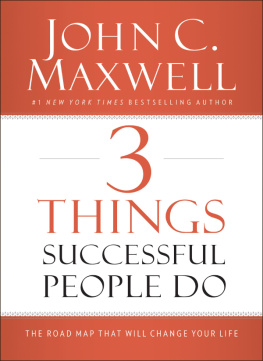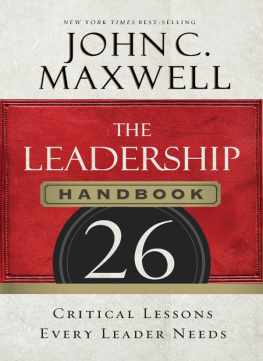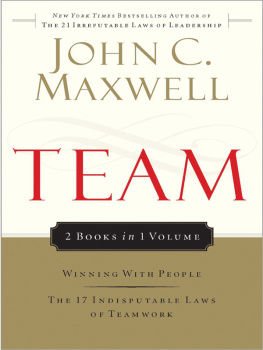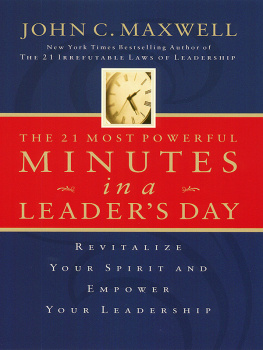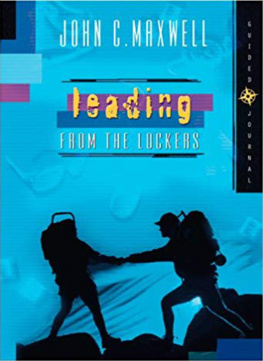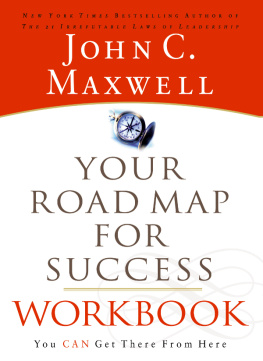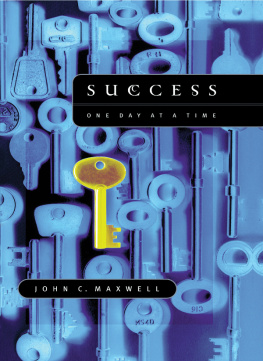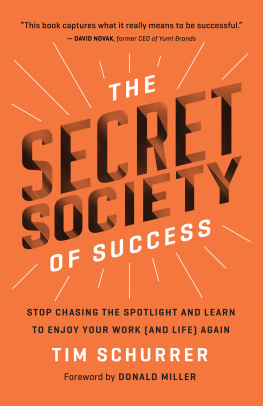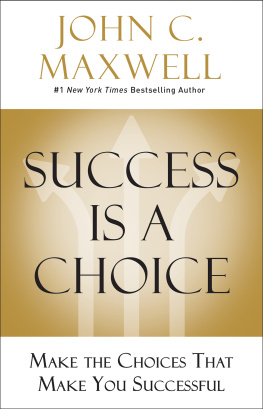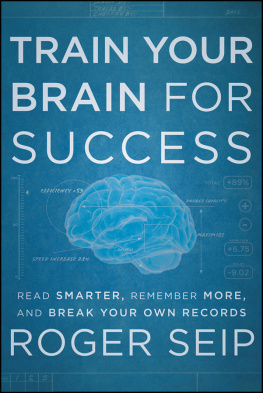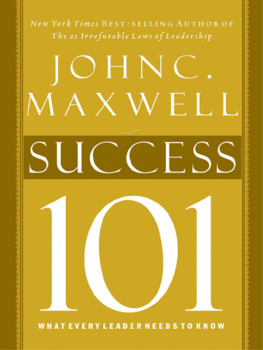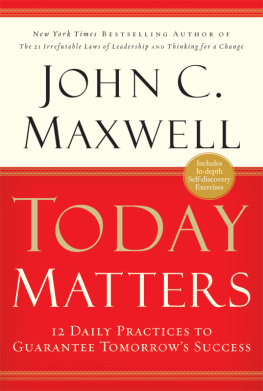Copyright 2016 by John C. Maxwell
All rights reserved. No portion of this book may be reproduced, stored in a retrieval system, or transmitted in any form or by any meanselectronic, mechanical, photocopy, recording, scanning, or otherexcept for brief quotations in critical reviews or articles, without the prior written permission of the publisher.
Published in Nashville, Tennessee, by Nelson Books, an imprint of Thomas Nelson. Nelson Books and Thomas Nelson are registered trademarks of HarperCollins Christian Publishing, Inc.
Published in association with Yates & Yates, www.yates2.com.
Nelson Business books may be purchased in bulk for educational, business, fund-raising, or sales promotional use. For information, please e-mail SpecialMarkets@ThomasNelson.com.
Any Internet addresses, phone numbers, or company or product information printed in this book are offered as a resource and are not intended in any way to be or to imply an endorsement by Thomas Nelson, nor does Thomas Nelson vouch for the existence, content, or services of these sites, phone numbers, companies, or products beyond the life of this book.
Scripture quotations noted NIV are taken from the Holy Bible, New International Version. Copyright 1973, 1978, 1984 by International Bible Society. Used by permission of Zondervan Publishing House. All rights reserved.
Scripture quotations noted KJV are from the King James Version of the Bible.
Interior designed by Mallory Perkins.
3 Things Successful People Do is an abridgment of Your Road Map to Success. Copyright 2002 by Maxwell Motivation, Inc., a Georgia Corporation. Previously published as The Success Journey. Copyright 1997 by Maxwell Motivation, Inc., a California Corporation.
ISBN 978-0-7180-1696-8 (HC)
ISBN 978-0-7180-1702-6 (e-book)
The Library of Congress has cataloged the earlier edition as follows:
Maxwell, John C., 1947
[Success journey]
Your road map for success / John C. Maxwell.
p. cm.
Originally published: The success journey. Nashville: T. Nelson, 1997.
Includes bibliographical references.
ISBN 0-7852-6596-1 (HC)
ISBN 0-7852-6408-6 (IE)
ISBN 0-7852-8802-3 (TP)
1. SuccessPsychological aspects. I. Title.
BF637.S8 M342 2002
158.1dc21
2001051211
16 17 18 19 20 RRD 6 5 4 3 2 1
Contents

In this ebook edition, please use your devices note-taking function to record your response wherever you see the bracketed instructions [Your Response], and use your devices highlighting function to record your answers when presented with a mutliple choice selection.

T hank you to:
Charlie Wetzel, my writer;
Stephanie Wetzel, for editing the early manuscript
and managing my social media; and
Linda Eggers, my executive assistant.

S everal years ago, as I was thumbing through Success magazine, I came across a study that Gallup did on what people thought it meant to be a success. That appealed to me because Ive always been interested in helping others to become successful, and I wanted to know what Gallup had gleaned. Their answers fell into twelve categories, but the number one answer was good health. Fifty-eight percent of the people identified that with success over anything else. I dont know about you, but I value good healthand after my heart attack I value it even more. But if I had only good health and nothing else, I dont know that I would label myself successful.
Ive discovered that people often find it hard to define success. But if you dont know what success is, how will you ever achieve it? Thats why I want to help you identify a definition of success that will work for you: success is a journey.
Let me begin to illustrate by telling you a story. Several years ago, I stood before the seventy-four employees of INJOYthe organization I had founded in 1985 to teach leadership and personal developmentand prepared to tell them some news that I knew would be exciting to some and discouraging to others. I was going to tell them that in a years time, we would be moving the company from San Diego, California, to Atlanta, Georgia.
My friend Dick Peterson, INJOYs president at the time, and I had been talking about the possibility of moving the company for about six months. It had begun as a casual what if... conversation, but then we started giving it more serious thought. We weighed the advantages and asked our director of finance to run some numbers. We talked about the opportunities that such a move would bring. And finally, we determined that moving to Atlanta made sense professionally, logistically, and economically. We knew that if we wanted to go to a new level in our growth and development, not only as a company, but as individuals, we needed to make the change.
In many ways, that was a very tough decision. I never expected to leave San Diego. From the day we moved there from Indiana, my wife, Margaret, and I felt that it was home. It was the only home that our kids, Elizabeth and Joel Porter, had ever really known. But as much as we loved living in San Diego, we were willing to make the sacrifice of moving away so that we could achieve greater success.
Our more serious concern was for the people on the INJOY team. We werent sure how they would react. San Diego is one of the most beautiful cities in the country, and the weather is perfect. Many of our employees were San Diego natives, and they had a lot to keep them there.
As I prepared to talk to the staff, there was a noisy energy in the room. All of us hadnt met as a group in almost a year, and I could see the excitement and anticipation in many of their faces.
Gang, Id like to have your attention, I started. I have a very important announcement to make. In one year from now, we will be moving INJOY to Atlanta. I saw a whole range of reactions. Some looked shocked. Others looked as if they had been punched in the stomach. Jayne Hansen, one of our best customer service representatives, was wide-eyed as her chin dropped, and she coughed out a short breath in disbelief every eight to ten seconds for the first minute that I talked. From our managers I saw relief: they had been keeping their knowledge of the move secret for weeks.
For fifty minutes, Dick Peterson and I explained all our reasons for the move, gave them stats and information on Atlanta, and showed them a video from the Atlanta Chamber of Commerce. And we told them that anyone who was willing to go to Atlanta would have a job when he or she got there. Then we introduced two people who had flown in from Atlantas best real estate agency to answer questions.
Willing to Take the Journey
We werent sure what kind of reaction we would get from our staff. We were proposing a major move that would radically change their lives. What a surprise it was when more than 90 percent of the team said they would move or at least consider moving to Atlanta! They were willing to take the trip.
That got me to thinking. Why were so many of them willing to be uprooted, leaving behind everything that was familiar, including family and friends, to move all the way across the country? I concluded that they were willing to go for four reasons:
1. We gave them a picture of where they were going.
As Dick, the two real estate agents, and I spoke to our people, we gave them a picture of our future in Atlanta: the positive working environment, the greater number of lives that we would be able to touch, the improvement in their quality of life, and the opportunity that we as a company would have to go to the next level. They could see it allthe benefits to them personally and to the company.
Next page
